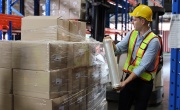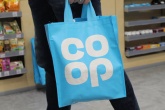Co-op latest supermarket to introduce compostable plastic bags
 The Co-op has revealed plans to cut single-use plastic bags from its stores in favour of reusable and compostable alternatives.
The Co-op has revealed plans to cut single-use plastic bags from its stores in favour of reusable and compostable alternatives.
The news, announced on Saturday (22 September), is part of a wider commitment by the chain to reduce its reliance on plastic packaging.
The Co-op now follows Waitrose in introducing compostable plastic bags in place of single-use plastic; Waitrose announced last week that it would be replacing all of its free fruit and veg bags with compostable ones. However, the Co-op is going one step further than Waitrose in committing to bring in compostable bags in place of its five pence single-use carrier bags (while still offering heavy-duty reusable carrier bags for 10 pence).
The chain is encouraging its customers to reuse the plastic bags as food waste caddy liners – a concept which could save users a considerable amount in comparison to the cost of a roll of official food waste bin liners.
Additionally, the change will take place only in stores located in areas where councils allow compostable bags to be placed in food waste bins – local authorities using anaerobic digestion (AD) to process their food waste may not accept the bags, as AD facilities cannot process compostable plastics, although most AD plants will remove plastics and other contaminants from the organic waste before processing.
Nevertheless, this is a welcome move that shows the Co-op has considered whether the introduction of the new bags will actually have an environmental benefit in every location. The supermarket has stated it will ‘be speaking with the remaining local councils to seek to extend coverage to more stores’.
The Co-op first began offering customers compostable bags back in 2014 in a smaller number of stores, at a cost of six pence, as an optional alternative to single-use plastic. The new compostable bags, provided by Italian bioplastics manufacturer Novamont, are a stronger and more durable version of this bag.
As well as introducing the five pence compostable bags in nearly 1,400 stores, the Co-op will be working to make its own brand packaging ‘easy to recycle’ by 2023, in a development of the supermarket’s previous commitment to make all its packaging 100 per cent recyclable (80 per cent by 2020). It has also pledged to use a minimum of 50 per cent recycled material in bottles, pots, trays and punnets by 2021.
“The price of food wrapped in plastic has become too much to swallow,” commented Jo Whitfield, the Co-op’s Retail Chief Executive. “The first step to remove single-use plastic will be to launch compostable carrier bags in our stores. They are a simple but ingenious way to provide an environmentally-friendly alternative to plastic shopping bags.
“Our ban on single-use plastic is central to our new ethical blueprint. The Co-op was founded on righting wrongs, and we first campaigned to stop food fraud. Now we face huge global challenges and have created a recipe for sustainability to source responsibly, treat people with fairness and produce products which have minimal impact on the planet.”
Attack on black plastic
Black plastic has also come under fire, with the company planning to eliminate black and dark plastic own-brand packaging by 2020. This type of material has been criticised by environmentalists for years, as the black pigment used to colour the plastic means it can’t be picked up by the infra-red sensors used in most plastic sorting plants. However, companies have continued to use the plastic, apparently because it is seen as a way to make food look more appealing.
While developments in recycling technology may see black plastic made more easily recyclable in the future, with waste management company Viridor and packaging manufacturer Faerch Plast working on a project to process the material for use in new food packaging, replacing black plastics with more commonly recycled alternatives – or eliminating the plastic element altogether, where possible – is the preferred option for many.
Lidl just pipped the Co-op to the post on this subject, with the budget chain announcing on 21 September that it will be phasing out black plastic packaging from its own brand fruit and veg by the end of the month.








